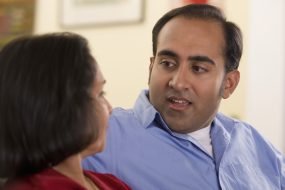Adhira and Neel’s Story

Adhira and Neel are a mother and son who both have ME/CFS. Together, they share their story.
Adhira: I had heard of ME/CFS before being diagnosed myself. I have a couple of autoimmune diseases, and once asked one of my doctors (years ago when I was in my late 30s) if I had ME/CFS. He wondered what I was talking about and told me I didn’t have it. But, years later, I developed mononucleosis and was then diagnosed with ME/CFS.
Neel: I would say that my experience was separate and different from my mother’s, but the initial knowledge base and learning to advocate for myself came from my mom. We have worked as a team to pass information back and forth. It is hard to advocate, but I have learned to advocate from my mom.
Adhira: My ME/CFS diagnosis took time to sort out because of my autoimmune disorder. I went to lots of providers—infectious disease specialists, neurologists, cardiologists, rheumatologists—and many thought my fatigue and symptoms were from the autoimmune disease.
Neel: Growing up, my mom couldn’t work because the fatigue was debilitating. I was diagnosed with an autoimmune disease at the age of 19. My ME/CFS symptoms include pain, fatigue, brain fog, dizziness, and POTS (postural orthostatic tachycardia syndrome). I have been bedbound and have been sick for so long that the definition of normal is so different for me.
Adhira: The fatigue that I have now is incredible. When I walk, it feels like I am walking through a tar pit. I spend anywhere between 50 to 100% of my time in bed, and I experience a racing heart, sweating, vertigo, headaches, pain in muscles and joints, cognitive decline and emotional dysregulation.
Neel: There is a huge amount of anxiety and depression with ME/CFS. The depression is secondary. You never know what is next or what the minutes of the day will be like. I could walk for 15 minutes and then the 16th minute could put me down. There is trauma, too. It is hard to talk and communicate with doctors. It is hard to find a therapist that understands.
Adhira: Just getting a diagnosis for ME/CFS is very difficult and challenging. It is just frustrating and exhausting that you have to do so much advocating for yourself because you do not have the capacity for it with this condition.
Neel: I have to negotiate relationships, and it is impossible to make plans. I can’t go on trips, and I don’t feel comfortable dating anyone. I am not financially independent. I have a supportive family and friends, but I rely on old friends.
Adhira: I am very fortunate to have a great family. My husband is understanding and has not complained about my health limiting our life together. The kids are also very understanding. When I was first diagnosed with an autoimmune disorder at 32, I struggled to raise a family. Then as the years went on, I was diagnosed with other autoimmune disorders, all in my mid to late 30s. I was hoping to work part time once my kids were in college as I have a master’s degree in Public Policy and Public Administration. I was brought up with a strong sense of family and responsibility. It takes a great deal of energy just to cook a meal for my family. I have few friends, as I have to cancel plans all the time.
Neel: I would tell people that your experience as a patient is valid. It feels like the whole system is broken. If you are the patient, realize your story and do the best you can. Give yourself permission. No one represents patients except for the patients themselves and their families. If you are the doctor, believe the patient experiences and listen with an open mind. Campaign for the health of your patients by asking them what they need and how you can help them get there.
Adhira: It is difficult and heartbreaking to see your child suffer with the same condition that you have, ME/CFS. But you can’t give up. You keep looking for help. You have to keep pushing forward and hopefully you get support.
Disclaimer: The opinions and conclusions on this web page are those of the patients and other contributors, and do not necessarily represent the official position of the Centers for Disease Control and Prevention (CDC). The names of some contributors have been changed to protect their privacy.